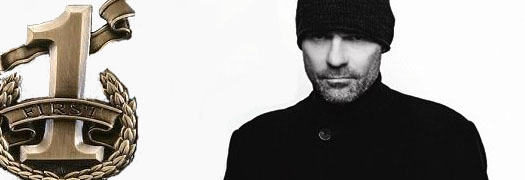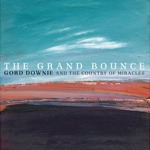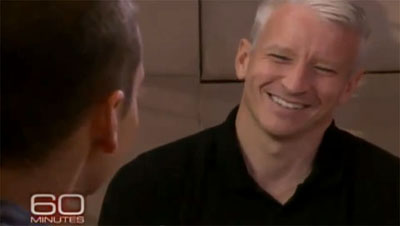
Features | Awards
The Leonard Cohen Award for Insisting on Rhyming "Orange"
By Scott Reid | 7 December 2010
 Gord Downie & the Country of Miracles
Gord Downie & the Country of Miracles
The Grand Bounce
(Universal/Wiener Art; 2010)
From “The Dance and the Disappearance”:
In orangey glows and sudbury yellows /
We are the dance and its disappearance /
But in the darkness there’s a tinge /
The slightest streak of blood-orange /
Like a drop of blood to the rusty door-hinge
Sure, it doesn’t quite reach the level of “check out this word science, Anderson Cooper!” hubris of Eminem cracking out not two but five sorta-rhymes for orange on 60 Minutes a few months back, but, hey, it’s certainly more poetic than “I put my orange four-inch door-hinge in storage and ate porridge with George.” Don’t think too hard about that one; the look on Anderson’s face right after Em delivers the “Geor-idge“ at the end says it all:

Anyway—it was just a matter of time before Downie winked this one out, a sly reference to Leonard Cohen’s repeated assertion that, yes, there are rhymes for orange to be found if you absolutely fucking have to. Just like it was a matter of time before we got a Downie-helmed song called “The Hard Canadian,” which he somehow manages to steer clear of conceptual cheese (especially given its title being borrowed from Trailer Park Boys’ creator Mike Clattenburg), instead three-chording his way through some dour character study (“The hard Canadian is all darkness in his heart / But for the glow of her nightgown through the dark … Whether he’s just mean or willfully dense he says, ‘From life nothing; to death nothing’”). Apparently there’s a video around of Gord performing the song with Gordon Lightfoot in Toronto this last Feburary; I assume while draped in giant maple leafs, chugging maple syrup, and riding atop those terrifying beavers from the Vancouver Olympics’ closing ceremony. Backwards, like Dudley Do-Right.
That The Grand Bounce, Downie’s first solo record in a long seven years, is in many ways the even longer-awaited proper follow-up to his debut Coke Machine Glow (2001), comes as a huge relief. Because of how relatively rushed and forgettable most of Battle of the Nudes sounds all these years later, yes, but moreso following the Bob Rock-produced trainwreck that was the Tragically Hip’s We Are the Same (2009). Some of The Grand Bounce’s best tracks sound like they were squirreled away during those sessions, careful to not let Rock get his “let’s Bruckheimer the shit out of this!” hands on them. (Seriously: “The Dance and the Disappearance” is their wheelhouse, and let’s be thankful he held it back, lest it end up with cock-rocking, fist-pumping “WOAH-OHHS” in the chorus like “Frozen in my Tracks.” Shudder.)
True, Bounce trades one awfully mismatched producer for, albeit to a lesser degree, another: Death Cab for Cutie’s Chris Walla. But, while Walla’s production does these songs no favors, especially when his fingerprints become unmistakable (see: the lame cascading keys on “Night is for Getting,” the album’s one must-skip), for the most part he manages to stand back and let each find their own ramshackle charm, putting the focus back on Downie’s exceptional talent as a lyricist. This was the secret to Coke Machine Glow’s success, despite its own equally meh production: allowing Downie’s poetry to breathe—to follow the whims of his writing instead of letting arrangements (see: those damn horns on “Pascal’s Submarine”) or misguided ambition (a la the nine-minute “Depression Suite”) get in the way. The Hip’s best post-Day For Night (1994) material—“Escape is at Hand for the Travelin’ Man,” “It’s a Good Life if You Don’t Weaken,” “Lake Fever,” “Flamenco”—did the same, defiantly eschewing the bar/stadium-rock-isms of their early days, which Rock had egregiously and hamfistedly led them back to.
Walla does sort of muck up the mix on the album’s best song, “Yellow Days,” though Downie’s delivery of lines like “Summer on! / Bring on the buzzing past / Bring on the August trash, the sweat of Johnny Cash, the hot-knife to the hash” can’t be derailed by that annoyingly prominent rattle. Again, it’s a matter of how much Walla is able to keep the everything-else from standing in the way of the lyrics; the real heart of “Yellow Days” is how it moves from the escapism of vague nostalgia to the silly, equally childlike threats of adulthood: “I will miss all the not-knowing of those summer days / But I swear, I will also take morphine and swim if you take one more look at him.” A brief pause, then back to the comforting, selective longing: “…Ah, those yellow days.” A better producer might milk the tension in these hairpin turns, but it still makes for The Grand Bounces’s most affecting four minutes.
There’s a bunch of other great stuff here, too: the steady bounce of the Julie Doiron-backed “Moon Over Glenora”; the beautiful, slow, shuffling gestures of “As a Mover” (again, fuck, those lyrics: “Got no opinion listening to the yessing of the snow / There’s no pressure, I’m not less sure I’m ready to go / ‘Oh I dare ya! Oh Daddy, take us everywhere!’”); the even slower, shaky ruminations of “Broadcast” (worth it for that last chorus alone); the haunting and barely-there piano tinklings of closer “Pinned.” Whatever its faults along the way, The Grand Bounce manages to not fall into the traps of Battle of the Nudes’ brash growing pains, or, more importantly, the hemorrhaging loss of focus on We Are the Same, where Downie inched shockingly close to caricature. Like with Coke Machine Glow, the subtle humour and (mostly) loose arrangements get to the heart of what makes Downie a remarkable songwriter, still—one who, at his best, hearkens back to Leonard Cohen in more ways than just tongue-in-cheeking an orange rhyme or two. Now if only he could manage to stumble upon a great producer once in his career…





